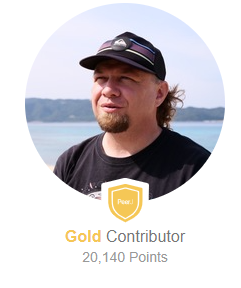James’ research focuses on the biodiversity of understudied marine invertebrate groups (so-called “minor taxa”), primarily benthic cnidarians including zoantharians and their endosymbionts, as well as octocorals, from shallow tropical coral reefs to the deep sea. Recent research has also examined the impact of coastal development on marine diversity and ecosystems.
In 2015, he was awarded the Okinawa Research Prize for science contributing to the well-being and understanding of the Ryukyu Islands, and in 2021, he was awarded the Narishige Prize by the Zoological Society of Japan in recognition of his unique research output.
He recently also became just the seventh researcher to become a Gold Contributor to PeerJ, putting him in the top 0.1% of contributors since we launched over a decade ago.
James joined the Editorial Board of PeerJ in 2015 and has been a Section Editor for Aquatic Biology since 2021. He has edited 189 articles, of which, to date, 153 have been published. As Section Editor he has overseen the peer review of one of our busiest sections, and is always on hand to provide insight and advice: one colleague writes “James provides good, thoughtful and nuanced decisions – he is an excellent Editorial Board Member”.
 We asked James to tell us why he contributes to PeerJ and open science, and what he enjoys about being a member of the Editorial Board: “Open Access for papers, data, and all things scientific is something I believe in. The publishing industry has a lot of issues to deal with, but the PeerJ model of reasonable pricing, a great editorial and journal team, and always striving for new initiatives and including us all in the process, is something I very much appreciate and feel lucky to be a part of! As an editor handling papers, I always very much enjoy seeing new science. The process of watching a paper go from submission through review to publication is rewarding too; most scientists are here to help, and as an editor I can participate in the human side of scientific publication. It is always fun, there may be some (usually good) unexpected developments, and I also get to read a lot of interesting papers.”
We asked James to tell us why he contributes to PeerJ and open science, and what he enjoys about being a member of the Editorial Board: “Open Access for papers, data, and all things scientific is something I believe in. The publishing industry has a lot of issues to deal with, but the PeerJ model of reasonable pricing, a great editorial and journal team, and always striving for new initiatives and including us all in the process, is something I very much appreciate and feel lucky to be a part of! As an editor handling papers, I always very much enjoy seeing new science. The process of watching a paper go from submission through review to publication is rewarding too; most scientists are here to help, and as an editor I can participate in the human side of scientific publication. It is always fun, there may be some (usually good) unexpected developments, and I also get to read a lot of interesting papers.”
James recently led a PeerJ Special Issue on “The State of Active Coral Reef Conservation and Restoration” and has regularly published in the journal, co-authoring 17 articles over the last 10 years. His first article in PeerJ – “Typhoon damage on a shallow mesophotic reef in Okinawa, Japan” – has been cited 41 times, whilst his recent contribution to “Building consensus around the assessment and interpretation of Symbiodiniaceae diversity” was published on May 2nd this year.
Everyone at PeerJ feels incredibly lucky to have the opportunity to work with James, and we offer our sincere thanks for his massive and significant contribution to the journal, and to open science.

